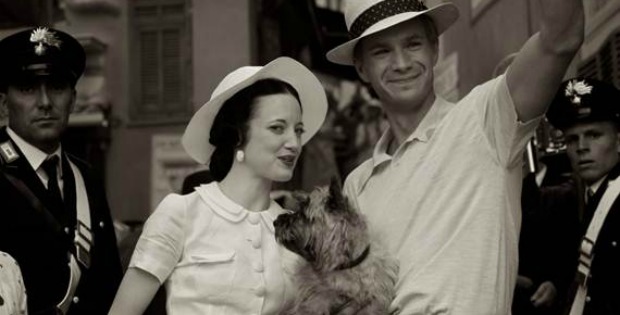W.E.
Madonna’s second foray into film directing naturally raises more scrutiny than is focused on her new film itself.
Plot summary
Transfixed by the exquisite artefacts of the Windsors' lives, Wally becomes obsessed with the love story of Wallis Simpson, the chic, charismatic American who captured the heart of King Edward VIII. As she learns more about the sacrifices Wallis made in choosing to be with Edward, Wally finds the courage to follow her own heart and create her own happiness.

Madonna’s second foray into film directing naturally raises more scrutiny than is focused on her new film itself, which is a pity because W.E. produces some memorable moments among its flawed narrative. In fact, had you not known it was the star in the writer-director’s seat, this love story still makes for a haunting picture of obsession that is pleasantly surprising to watch, and offers some strong female performances.
W.E. tells the story of two fragile but determined women separated by six decades – Wallis Simpson (Andrea Riseborough), the American divorcée King Edward VIII (James D’Arcy) abdicated the British throne for back in 1936, and New Yorker Wally Winthrop (Abbie Cornish) living in 1998 who is obsessed with Simpson and what she perceives was the ultimate love story. Winthrop’s research that includes visiting the Sotheby’s auction of the Windsor Estate reveals that the couple’s life together – as with Wally’s own troubled marriage – was not as perfect as she first imagined.
The most significant thing you take away from W.E. is Andrea Riseborough’s huge talent – star of Brighton Rock and Made In Dagenham, and the exciting knowledge at how her career should go stratospheric after her Wallis portrayal, regardless of any criticism of the director or film itself. She is a creature of pained and compelling feminine beauty in this, an apt chameleon of emotions and thoughts stuck in a daydreamy, if rather bizarre and often uneven time-travelling narrative.
As Wallis in the story’s flashbacks, Riseborough is perfectly cast to fully flesh out the image and the workings of the woman behind one of the biggest 20th Century royal scandals – even if Madonna only touches on Simpson’s Nazi Germany sympathies with the odd comment in the script. With D’Arcy commendably playing the confused but besotted ‘puppy dog’ Edward or ‘David’, Riseborough is able to relay both Wallis’s intentional and unintentional manoeuvres that ultimately conclude with her living like a trapped bird in a gilded cage. As this is a favourable Simpson portrayal, you cannot help but feel a slight dig at ingrained British conceit; the cynics among us might draw parallels with the American superstar’s own failed relationship with a Brit on these shores.
The scenes from the past are beautifully imagined and elegantly shot with the same attention to detail and chimerical quality as Tom Ford’s own tragic love story, A Single Man. However, the present ones with stunning Cornish playing the unhappy wife of a philandering British doctor feel confused and often claustrophobic, without the breathing space to adequately set the mood at times. Even with Cornish’s bereft allure as a woman trying to find happiness within her Simpson obsession, Madonna’s colourful mixture of composition and odd framing distracts from the equally fascinating story of an affluent female trapped in a miserable existence. Madonna has honed some engaging female performances, and Cornish is mesmerising as Wally as Riseborough is as Wallis.
There are some bizarre tangents to the film that grate and rudely awaken you from the dream, such as abused Wally’s escape to her lover’s loft apartment and her subsequent aimless wandering through downtown NYC that feels unnecessary, especially as she then finds the inner strength to carry on in her international quest to expose the truth behind the Windsor affair. It is at this point in the film that the contemporary tale gains any compassionate ground with the past, only for Madonna to opt for a lazy New York fairy-tale ending in Central Park, like something brash out of a rom-com.
Madonna’s directing inexperience aside, her vision for W.E. is an admirable one about two strong women; she gets to paint one of her apparent American heroines in a different light, however manipulative that may sound, in order to suggest how such a love affair remained so strong among public condemnation. Perhaps it’s the romantic in us all, but W.E. is a passionate love story you can easily venture into, without trying to rewrite history – its main weakness being the contemporary tale it uses to draw muddled parallels with, even though both its female leads do splendidly with the material.











COMMENTS